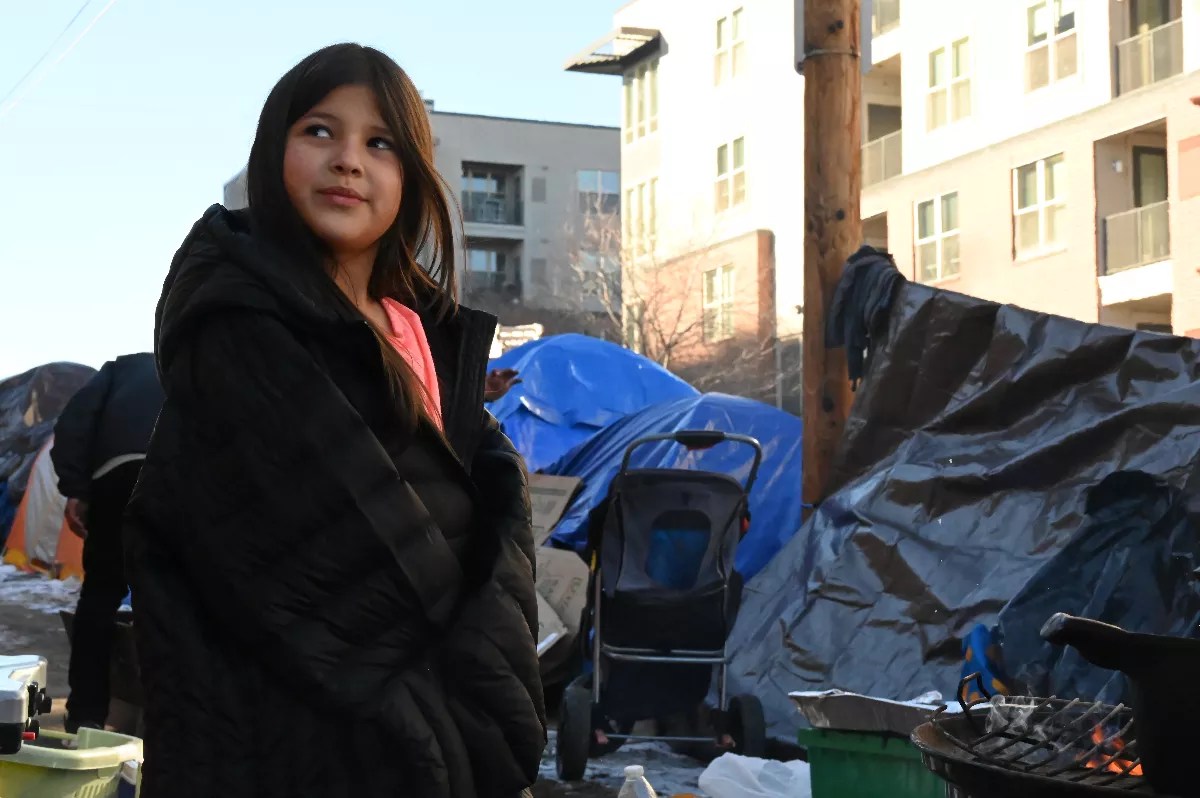
Bennito L. Kelty

Audio By Carbonatix
Given a choice between going to another city or sticking it out in Denver, Teresa Ruiz has decided to stay put – even as her family faces being discharged from the Quality Inn at 2601 Zuni Street, one of the migrant shelters that will again be enforcing a length-of-stay policy starting February 5.
“I like this city. It seems like a peaceful city,” Ruiz says. “The people here are very humble, very good. In reality, I like this city. They did tell me, suggest I go to another city, but I don’t want to move from here.”
Ruiz is from Venezuela. She and her husband, along with three children, arrived in Denver in late November, shortly after the city suspended its length-of-stay policy on November 17 for migrant families in order to keep them out of the cold.
The city recently told her that the family has to leave the shelter on February 10, and offered tickets to another city, Ruiz says, but she turned them down. Her family still has the option of accepting tickets to another location – they just need to tell staff at the shelter they want to go – but Ruiz is set on staying in Denver for now.
Worried that the renewed length-of-stay policy will lead to more people sleeping on the streets, the city has been urging more migrants to try their luck in another city, according to Jon Ewing, spokesman for the Denver Department of Human Services.
“We’re just really pushing, trying to tell people, ‘Look it’s just not that expensive in every other city,'” Ewing says. “Denver is kind of an outlier, obviously, in the amount of help and support we’ve provided, but also we’re more expensive.”
More than 38,000 migrants, mostly from Venezuela, have arrived in Denver since December 2022, usually via buses chartered in Texas. After they get here, the city offers them either a spot in a shelter or a ticket to another location; about half the migrants will take the tickets.
So far, Denver has spent more than $40 million offering migrants those two choices, and could spend up to $180 million – equal to 10 percent of the city’s operating budget – to continue doing so this year, a projection that has forced Mayor Mike Johnston to ask departments to plan for major budget cuts.
“The city is currently in the process of drawing funds from our contingency reserves to meet the needs of the most recent surge in arrivals,” says Laura Swartz, spokesperson for the Denver Department of Finance. “This funding is anticipated to cover costs through April. All agencies have also been asked to identify potential savings within their 2024 budgets. It is too early right now to say what specific savings will be until we have had the time to assess and identify options. That work is underway now and will take several weeks to a few months to complete.”
Migrants who have chosen to stay in shelters have had to deal with Denver’s length-of-stay policy, first instituted by the Hancock administration in March, Ewing says. It requires that individual migrants without kids leave shelters after fourteen days. Initially, families with kids had 21 days, then 37. Once the limits are again imposed, they’ll have 42 days.
Shelters had stopped discharging migrants without kids during a severe weather emergency, but began discharging them once again when the weather emergency expired on January 20.
While the length-of-stay policy was deactivated, close to 5,000 migrants were staying in Denver’s shelters; that number “is just not sustainable,” Ewing says. Just under 4,000 migrants were staying in shelters as of January 30, largely because of a slowdown in buses arriving during the cold weather.
“The only reason that we didn’t go fully over capacity and have to turn people away was because the buses stopped coming,” Ewing says. “We were making do with ten, eight or nine empty hotel beds a day.”
Denver has ten migrant shelters scattered across the city, as well as one in Aurora. Two of those shelters are congregate shelters, which only allow adult migrants; the city plans to consolidate those into one. As for the others, “you could see shelters closing if we get to a lower number of people, if we don’t start getting a lot of new arrivals,” Ewing says.
But there are other challenges. “If there are families and the kids are in school, we can’t just move them to another site and not think about that sort of thing,” he adds. “We have to make sure the families are taken care of, too.”
Once the length-of-stay policy for families is reactivated, the city projects that as many as 350 migrants will be discharged from shelters each week over the next two months. The number “is not that far removed from a few months ago,” Ewing says.
The city only projected two months out to allow for adjustments. “That number will fluctuate based on things we can’t possibly model because we don’t know how many people are going to arrive,” he adds. “It could go up to 500 or so a week. That’s possible, or even 600, depending on how many people are arriving. But to start out, I think you’re going to see 350 to 400 a week.”

Eight-year-old Aranza Delgado at the migrant encampment that used to be outside the Quality Inn at 2601 Zuni Street.
Bennito L. Kelty
Migrants are allowed to leave shelters on their own, which may affect the numbers. “If we get you assistance or you decide to take us up on travel, you probably don’t want to wait for your discharge date,” Ewing notes. “The numbers could fluctuate based on people leaving before their 42 days or 14 days are up.”
Luis Rafael Rios, a Venezuelan migrant staying at the Quality Inn, is mulling the city’s offer of free tickets to another city before he, his wife and their two-year-old son have to move out at the end of February.
“We’re still thinking about it,” Rios says. “I don’t really know what other city we would go to, but we’re not finding any work out here. So if there’s somewhere else that would work out better for us, we’ll consider it.”
The city expects about 150 migrants will be discharged on February 5, when the length-of-stay policy is reinstituted. The city will first discharge families that wouldn’t normally qualify for a spot in a shelter but got into one after the winter-policy pause on November 17. They’ll leave alongside “individuals who will just happen to be timing out anyway,” Ewing notes.
Migrants are only eligible for shelters if they’d been in the U.S. fewer than thirty days before arriving in Denver and have an Alien Registration Number, a temporary identification number given to migrants by immigration officials when they land in the U.S.
The city is working hard to make sure it doesn’t release migrants directly into homelessness. “We are absolutely doing everything we can to get people into housing or get them into a better spot,” Ewing says. “Everybody is worried that people are going to fall into homelessness, and I can just say that we’re going to do everything in our power to make sure that doesn’t happen.”
Aside from offering tickets to other locations, Denver is hosting work clinics to help migrants apply for work authorization and coordinating with nonprofits like ViVe Wellness to find other housing options.
Maria Garcia, another Venezuelan migrant staying at the Quality Inn with her two kids, will have to leave on February 10. The city told her that “by 11 in the morning, we can’t have anything left in the room,” she says. “It doesn’t matter if you found somewhere else to stay or not. There are organizations that will help, we were told, with finding another place or with trying to get permission to work, but we still don’t really know what we’re going to do.”
As non-citizens, migrants can’t work unless they have work authorization. Venezuelan migrants who arrived in the U.S. before July 31 can get work authorization through Temporary Protect Status, a federal policy meant to protect immigrants from countries dealing with humanitarian crises. Another way to attain work authorization is to be granted asylum, or have had an asylum claim pending for 150 days. The last avenue for work authorization is to be paroled by immigration officials at the border, or given permission to temporarily live and work in the U.S. while looking for a way to stay permanently.
The city is working with migrants to find out if they’re eligible for work authorization and, if so, to help them apply. But the majority aren’t eligible.
“It’s not the majority percentage of them who qualify for work authorization,” Ewing says. “That’s why you see people out on the street squeegeeing cars up and down Federal or you go to Home Depot on a Saturday and they’re looking for work.”
Garcia wants to stay in Denver because the few friends she’s made in the U.S., including Ruiz, are here. But she knows that “sleeping on the street is prohibited,” she says, because the city told her so when it gave her family the February 10 deadline for leaving the shelter.
Ewing confirms that the city is discouraging migrants from sleeping on the streets. “There is a camping ban in Denver, but beyond that, it’s also dangerous, unsafe,” he says. “And there’s the fact that once you start camping, you’re focusing on your day-to-day survival. What we want is for you to be focused on long-term strategies.”
Ruiz is spending her remaining time in the shelter applying for apartments, “but we have to work to pay rent, but we can’t work because we’re not citizens,” she says. Still, she’s “very, very, very grateful” for the time her family has had in the shelter.
“Here they’ve treated me very well,” she says. “I’m not sure what I’ll find in other places.”